Institutional Federal Compliance Report
1. Student Identity Verification in Distance and Correspondence Education
Evidence to Demonstrate Compliance: | |
1. Policies and/or procedures used to ensure student identity verification in distance or correspondence education courses | Institutional Norms for Ensuring The Quality of Distance Education: – English Version – Spanish Version Student and Faculty Authentication Procedure Students Identity Policy and Procedure: Weblink for Authentication Process: https://aguadilla.inter.edu/online/proceso-autenticacion/ Weblink for Academic Integrity and Proctor Test information:https://aguadilla.inter.edu/online/online-examenes-custodiados-2/ Authorization to Carry Out Personal and Academic Procedures |
|
2. Policies and/or procedure(s) regarding the protection of privacy (i.e. FERPA) for students enrolled in distance and correspondence courses or programs, including password verification | Student and Faculty Authentication Procedures Protection of Privacy for Online Students Weblink to University Policy Regarding Student and Alumni Directory (FERPA) |
|
3. Procedure(s) for notifying students about any projected additional charges associated with student identity verification. Evidence should include URLs, catalogs, student handbooks, and other locations of any alternative institutional website documenting required disclosures | Weblink for Tuition and Fees: General Information on Financial Aid Aguadilla Weblink for Tuition and Fees: |
2. Transfer of Credit Policies and Articulation Agreements
3. Title IV Program Responsibilities
|
Evidence to Demonstrate Compliance: | |
|
1. The most recent three-year Official Cohort Default Rate. If applicable, submit reports on compliance from the USDE in regard to the cohort default rate, including any default reduction plans | |
|
2. Financial Responsibility Composite Scores for the three most recent fiscal years. For clarity, this information may be presented as a table. (private and for-profit institutions only) |
Financial Responsibility Composite Scores Table Financial Responsibility Composit Scores 2018-2019 |
|
3. Letter or notification confirming the institution’s status as a public institution from an appropriate official from a state or other governmental agency with the legal authority to make such a designation (public institutions only) |
Not Applicable |
|
4. Final Program Review Determination Letter or Expedited Determination Letter and any major correspondence from the most recent program review since the institution’s last Verification of Compliance Review. If a program review is in process or an audit is underway, provide major documentation that is available such as Notification for the Program Review or Preliminary Findings. The institution should provide status reports or documentation if it has requested an extension or filed an appeal | |
|
5. Single Audit (OMB-Circular A-128; OMB Circular A-133, 2 CFR 200 Subpart F; Uniform Guidance) on federal programs for the most recent three fiscal years available (non-Profit institutions only) |
Inter American University Single Audits for years 2019, 2020 and 2021: |
|
6. Relevant correspondence from the USDE, since the institution’s last Verification of Compliance Review, such as any actions to limit, suspend, or terminate the institution’s eligibility to participate in title IV programs, including institutional response, if applicable |
Not Applicable |
4. Institutional Records of Student Complaints
|
Evidence to Demonstrate Compliance: | |
|
1. Policy and/or procedures for student complaints. Include the URL and any other public location where these documents are made available to students and the public |
General Students Regulation – Article 2 Section A-17 (pages 1-9) How to file a complaint or claim Weblink to file a complaint or claim |
|
2. Public location of contact information that the institution provides enrolled and prospective students for filing complaints with the institution’s accreditor and with its state approval or licensing entity and any other relevant state official or agency that would appropriately handle a student’s complaint. Include the URL and any other public location, if any | Weblink to file a complaint or claim Student Complaint Management |
5. Required Information for Students and the Public
|
Evidence to Demonstrate Compliance: | |
|
1. URLs, catalogs and student handbooks, and other public locations of any alternative institutional website documenting required disclosures of graduation, completion, licensure pass rate and other data required by Student Right to Know*, as well as policies on Satisfactory Academic Progress (SAP), refund, withdrawal, leave of absence, and attendance | InterAmerican University Catalogs Student Right to Know Webpage General Student Regulations: Weblink for General Student Regulations handbook in Student Right to Know Satisfactory Academic Progress Policy and Bulletins: Satisfactory Academic Progress Norms for Technical Studies Satisfactory Academic Progress Norms for Undergraduate Programs Satisfactory Academic Progress Norms for Graduate Programs Withdrawal Policies Leave of Absence Normative Document Attendance Policies Consumer Handbook |
|
2. URLs, catalogs and student handbooks, and other public locations of any alternative institutional website documenting disclosure of program completion eligibility to meet State licensure requirements including States for which the curriculum meets and does not meet State eligibility requirements, and for which eligibility has not been determined |
Weblink for State Licensure Requirements |
|
3. Documents and URLs for clear and accurate information wherever accreditation is referenced available to current and prospective students that show the accreditation phase and accreditation status with the Middle States Commission on Higher Education as well as the contact information for the Commission |
Weblink for IAUPR Aguadilla Campus Portal to MSCHE Accreditation Phase and Status |
|
4. Provide an explanation for how the institution verifies that the posted student outcomes data are accurate |
Verification of Student Outcomes data by External Sources The accuracy of posted student outcome data as it relates to licensure pass rates are verified through an official letter of notification from the Board of Examiners for the respective health profession programs (i.e. nursing, pharmacy, radiology, psychology, speech and language therapy, etc…) following an initial written request by the Department of Health Sciences Director for examination results. The accuracy of posted student outcome data for the Teacher Education Program (TEP) are verified by official test results from the College Board which are received after administration of the exam. This examination result data is then reported in the TEP Program’s Title II Report Card in compliance with the Federal Department of Education, Title II Office. Accredited programs must inform student outcomes data to comply with mandates of the accrediting body and as such the accuracy of data is verified through compliance with accreditation requirements. Verification of Student Outcomes Data by Internal Sources The Banner system is the repository of IAUPR students’ demographic and academic information. In the academic units, different levels of access, restricted and supervised, are assigned to the collaborators who provide services to our students and who enter this information into the system. Each collaborator has a unique access code or password to the information systems in the databases, which is changed from time to time for greater security. The information system contains technological programming tools, with the proper technological and information security features, which allow us to generate databases with different parameters, which are used to create the different statistical reports. The creation of these statistical reports is achieved after a series of tests are carried out to verify that the students included in the report comply with the parameters that the report is intended to collect, to ensure that the published data are correct and updated. After student outcome data is verified as described, the Development and Alumni Office is charged with the accurate disclosure of such data. The Office of Distance Education and Internationalization ensures the accurate posting of data. |
*Many institutions create a single portal page on the institution’s web site that provides hyperlinks to disclosure information (Consumer Information Page, Student Right to Know, HEOA, Fast Facts, At A Glance, etc.). This is the recommended approach as it facilitates the review by the Commission since it consolidates the information in one place and meets multiple accountability requirements at one time.
6. Standing with State and Other Accrediting Agencies
|
List of Evidence to Demonstrate Compliance: | |
|
1. Names of other accreditors, program(s) it accredits, and year of next review |
All of the academic programs are accredited by the Department of Education of Puerto Rico and Puerto Rico Council of Education (CEPR). In addition, the Campus maintains the following accreditations. 1. Council for the Accreditation of Education Preparation (CAEP), 10 BA in Education programs, 2022-2023 2. Accreditation Commission for Education in Nursing (ACEN), 1 AAS Nursing, 1 BSN Nursing programs, 2028 3. Council on Social Work Education (CSWE), 1 BA in Social Work Program, Self-Study submitted in August 2022. 4. Puerto Rico Council of Education (CEPR), INTERTec license The following documents detail the accreditor, programs it accredits, and year of next review. Professional Accreditation Plan.pdf Professional Accreditation Plan Summary 2020-21 to 2024-25.pdf Professional Accreditation Plan Summary 2014-15 to 2019-20.pdf The name of accreditors, program(s) it accredits, and year of next review are publicly available here: |
|
5. Documents and URLs available to current and prospective students that show the most recent updated degree granting authority, charter, or license with an appropriate jurisdiction and the current accreditation status with other USDE recognized accrediting agencies |
Institutional URL available to current and prospective students: Relevant Aguadilla Campus Accrediting Agencies Campus website ACEN CEPR |
|
6. Report from State or other accreditor if institution has been found noncompliant (including institutional response) within the last five years |
Not Applicable |
- Written Arrangements
|
Evidence to Demonstrate Compliance: | |
|
1. List of current written agreements, including the name of third-party and educational program(s) involved, and date of Commission approval |
Not Applicable |
|
2. Documents and/or URLs available to current and prospective students that describe written arrangements including: the name of the educational program(s) involved; the portion of the educational program not provided by the institution; the name and location of the other unaccredited or ineligible third party providers; and the method of delivery and estimated additional costs of that portion of the program |
Not Applicable |
8. Assignment of Credit Hour
|
Evidence to Demonstrate Compliance: | |
|
1. Policy and procedures for assignment of credit hour for all types of courses, disciplines, programs, credential levels, formats, regardless of modality). Include the URL and any other location where the documents are disclosed to students and the public | Guidelines for Curriculum Development at the Inter American University of Puerto Rico- Page 2 Technical Certificate Programs Catalog 2025-2026 Credit Hour General Catalog 2025-2026 Credit Hour Graduate Catalog 2025-2026 Credit Hour |
|
2. Course or program review procedures and sample approval documentation, as they relate to credit hour |
Office of Curriculum Affairs |
|
3. Process the institution utilizes to verify length of academic period and compliance with credit hour requirements | Academic Years, Academic Calendars, Payment Periods and Disbursements-US Department of Education Weblink for Campus Academic Calendars Credit Hour Requirements Technical Certificate Programs Catalog 2025-2026 General Catalog 2025-2026 Graduate Catalog 2025-2026 Guidelines for the Review and Evaluation of Single and Shared Academic Programs Banner System Federal Student Aid Handbook |

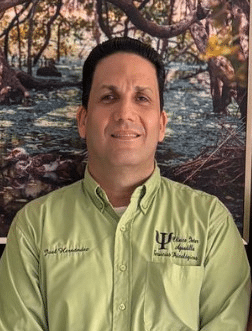 Programa de estudio: Maestría en Ciencias en Consejería Psicológica con Especialidad en Familia
Programa de estudio: Maestría en Ciencias en Consejería Psicológica con Especialidad en Familia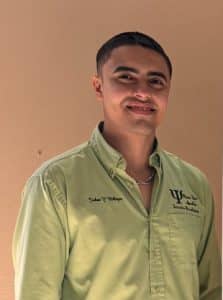 Maestría en consejería psicológica con especialidad en Familia
Maestría en consejería psicológica con especialidad en Familia Entre mis metas a largo plazo se encuentra la realización de un grado doctorado en Psicología Clínica, con el propósito de profundizar en el conocimiento teórico y práctico de la disciplina. Asimismo, aspiro a especializarme en el área de psicooncología, como también en intervenciones psicológicas asistidas con animales, con el fin de ofrecer un abordaje integral y humanizado a las personas que atraviesan situaciones de enfermedad o vulnerabilidad emocional.
Entre mis metas a largo plazo se encuentra la realización de un grado doctorado en Psicología Clínica, con el propósito de profundizar en el conocimiento teórico y práctico de la disciplina. Asimismo, aspiro a especializarme en el área de psicooncología, como también en intervenciones psicológicas asistidas con animales, con el fin de ofrecer un abordaje integral y humanizado a las personas que atraviesan situaciones de enfermedad o vulnerabilidad emocional.
 Elaine S. Sanchez Ramos es estudiante del programa de Biología en la Universidad Interamericana de Puerto Rico, Recinto de Aguadilla. Participara en el simposio con un afiche, titulado “Antibiotic Resistance in Bacteria Isolated from the Beaches of Aguadilla, Puerto Rico”. Su futura área de estudio es Optometría o Salud Pública. Su motivación para realizar esta investigación surge a partir de querer comprender cómo el problema de los microorganismos resistentes a antibióticos afecta nuestra área geográfica y pudiese ocasionar complicaciones de salud en la población del área oeste de la isla.
Elaine S. Sanchez Ramos es estudiante del programa de Biología en la Universidad Interamericana de Puerto Rico, Recinto de Aguadilla. Participara en el simposio con un afiche, titulado “Antibiotic Resistance in Bacteria Isolated from the Beaches of Aguadilla, Puerto Rico”. Su futura área de estudio es Optometría o Salud Pública. Su motivación para realizar esta investigación surge a partir de querer comprender cómo el problema de los microorganismos resistentes a antibióticos afecta nuestra área geográfica y pudiese ocasionar complicaciones de salud en la población del área oeste de la isla. Andrea N. Arce Rodríguez es estudiante del programa de Biología en la Universidad Interamericana de Puerto Rico, Recinto de Aguadilla. Participara en el simposio con una presentación oral, titulada “Evaluating the toxic effects chromium: My experience with the Wise lab”. Andrea aspira entrar a una escuela de medicina, para realizar un MD/PhD. Su motivación para realizar esta investigación surge de su pasión e interés hacia la toxicología y cómo las sustancias afectan a los seres vivos y a los ecosistemas.
Andrea N. Arce Rodríguez es estudiante del programa de Biología en la Universidad Interamericana de Puerto Rico, Recinto de Aguadilla. Participara en el simposio con una presentación oral, titulada “Evaluating the toxic effects chromium: My experience with the Wise lab”. Andrea aspira entrar a una escuela de medicina, para realizar un MD/PhD. Su motivación para realizar esta investigación surge de su pasión e interés hacia la toxicología y cómo las sustancias afectan a los seres vivos y a los ecosistemas.
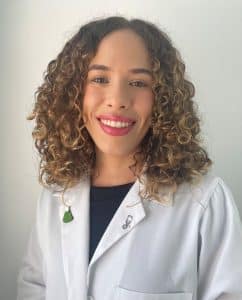 Beatriz González Ruiz es estudiante del programa de Biología en la Universidad Interamericana de Puerto Rico, Recinto de Aguadilla. Participará en el simposio con una presentación tipo afiche, titulada «Evaluation of Plankton Diversity in the Beaches of Aguadilla, Puerto Rico«. Su futura área de estudio es Farmacia o Farmacología. Su motivación para realizar esta investigación surge de explorar la gran diversidad de especies de plankton, las cuales son indicadores clave para la salud marina. Esto, con el propósito de educar a la comunidad sobre su gran importancia en los ecosistemas acuáticos, y crear conciencia sobre la protección hacia nuestros cuerpos de agua.
Beatriz González Ruiz es estudiante del programa de Biología en la Universidad Interamericana de Puerto Rico, Recinto de Aguadilla. Participará en el simposio con una presentación tipo afiche, titulada «Evaluation of Plankton Diversity in the Beaches of Aguadilla, Puerto Rico«. Su futura área de estudio es Farmacia o Farmacología. Su motivación para realizar esta investigación surge de explorar la gran diversidad de especies de plankton, las cuales son indicadores clave para la salud marina. Esto, con el propósito de educar a la comunidad sobre su gran importancia en los ecosistemas acuáticos, y crear conciencia sobre la protección hacia nuestros cuerpos de agua. Khetzie M. González Guerrero es estudiante del programa de Toxicología en la Universidad Interamericana de Puerto Rico, Recinto de Aguadilla. Participará en el simposio con una presentación de afiche titulada “Characterization of UV-induced cell line”. Su futura área de estudio es Salud Pública. Su motivación para realizar esta investigación surge del interés en comprender cómo el cuerpo responde a factores ambientales que afectan la salud de las barreras epiteliales.
Khetzie M. González Guerrero es estudiante del programa de Toxicología en la Universidad Interamericana de Puerto Rico, Recinto de Aguadilla. Participará en el simposio con una presentación de afiche titulada “Characterization of UV-induced cell line”. Su futura área de estudio es Salud Pública. Su motivación para realizar esta investigación surge del interés en comprender cómo el cuerpo responde a factores ambientales que afectan la salud de las barreras epiteliales.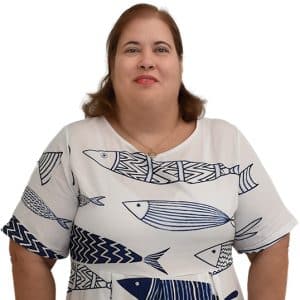 Durante toda mi vida me ha apasionado las ciencias biologías y comencé mi preparación académica con un BS. en Microbiología Industrial en la UPR- Recinto de Mayagüez, me fui a Florida y realicé MS en Biología Molecular y Microbiología en UCF, donde realicé investigación en producción de biofármacos en el cloroplasto de planta transgénicas. Por último, realicé un PhD. en Ciencias Ambientales con especialidad en Biología en UAGM Gurabo, donde realicé mi disertación en biotecnología ambiental. Como profesor universitario con formación especializada en microbiología, biotecnología, he dedicado mi carrera a la docencia, el desarrollo curricular y la investigación aplicada en sistemas biotecnológicos sostenibles. A lo largo de los últimos años, he diseñado e impartido cursos a nivel subgraduado y graduado en temas como técnicas de cultivo celular, genética molecular, bioinformática y biotecnología agrícola y ambiental, con un enfoque particular en el aprendizaje activo y basado en investigación.
Durante toda mi vida me ha apasionado las ciencias biologías y comencé mi preparación académica con un BS. en Microbiología Industrial en la UPR- Recinto de Mayagüez, me fui a Florida y realicé MS en Biología Molecular y Microbiología en UCF, donde realicé investigación en producción de biofármacos en el cloroplasto de planta transgénicas. Por último, realicé un PhD. en Ciencias Ambientales con especialidad en Biología en UAGM Gurabo, donde realicé mi disertación en biotecnología ambiental. Como profesor universitario con formación especializada en microbiología, biotecnología, he dedicado mi carrera a la docencia, el desarrollo curricular y la investigación aplicada en sistemas biotecnológicos sostenibles. A lo largo de los últimos años, he diseñado e impartido cursos a nivel subgraduado y graduado en temas como técnicas de cultivo celular, genética molecular, bioinformática y biotecnología agrícola y ambiental, con un enfoque particular en el aprendizaje activo y basado en investigación. La profesora Aris A. Román Silva posee un Doctorado en Filosofía con especialidad en Psicología Industrial Organizacional de la Universidad de Puerto Rico, Recinto de Río Piedras, así como una Maestría en Administración de Empresas de la Universidad de Puerto Rico, Recinto de Mayagüez. Esta sólida formación académica le permite integrar perspectivas psicológicas y gerenciales en la docencia, la investigación y el desarrollo institucional. Sus áreas de mayor interés investigativo son las dinámicas sociales y culturales que afectan el entorno de los individuos, así como las estructuras organizacionales y su influencia en el bienestar individual y colectivo. Demuestra un fuerte compromiso con la aplicación de metodologías cuantitativas y cualitativas para el análisis de fenómenos psicológicos, sociales y organizacionales, con énfasis en la formación de competencias investigativas en estudiantes del nivel graduado.
La profesora Aris A. Román Silva posee un Doctorado en Filosofía con especialidad en Psicología Industrial Organizacional de la Universidad de Puerto Rico, Recinto de Río Piedras, así como una Maestría en Administración de Empresas de la Universidad de Puerto Rico, Recinto de Mayagüez. Esta sólida formación académica le permite integrar perspectivas psicológicas y gerenciales en la docencia, la investigación y el desarrollo institucional. Sus áreas de mayor interés investigativo son las dinámicas sociales y culturales que afectan el entorno de los individuos, así como las estructuras organizacionales y su influencia en el bienestar individual y colectivo. Demuestra un fuerte compromiso con la aplicación de metodologías cuantitativas y cualitativas para el análisis de fenómenos psicológicos, sociales y organizacionales, con énfasis en la formación de competencias investigativas en estudiantes del nivel graduado.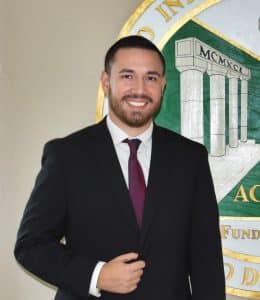 El Dr. Jorge A. Agudo Ruiz es catedrático auxiliar en el Departamento de Ciencias y Tecnología de la Universidad Interamericana de Puerto Rico, Recinto de Aguadilla. El Dr. Agudo imparte cursos en ciencias biológicas a nivel subgraduado y graduado. También, es presidente del Senado Académico y del Comité de Política Educativa del Consejo Universitario. Anteriormente, fungió como Coordinador de Avalúo del Aprendizaje, Especialista en Desarrollo Curricular, Especialista en Investigación y Extensión, y ha colaborado con acreditaciones institucionales. También, se desempeña como consejero académico de dos organizaciones estudiantiles en el Recinto: Sociedad Estudiantil de Toxicología y Juventud Universitaria Católica. Sus intereses de investigación están relacionados con la calidad del agua y la diversidad microbiológica en las playas del área oeste de Puerto Rico. Su formación académica incluye un Doctorado en Educación en Currículo y Enseñanza en Biología, una Maestría en Ciencias en Toxicología Clínica, una Maestría en Ciencias en Biotecnología y un Bachillerato en Ciencias en Biotecnología. El Dr. Agudo-Ruiz es miembro de la Sociedad de Toxicología, la Asociación Nacional de Educadores de Biología, la Sociedad Nacional de Honor de Biología y la sociedad de honor para educadores Pi Lambda Theta.
El Dr. Jorge A. Agudo Ruiz es catedrático auxiliar en el Departamento de Ciencias y Tecnología de la Universidad Interamericana de Puerto Rico, Recinto de Aguadilla. El Dr. Agudo imparte cursos en ciencias biológicas a nivel subgraduado y graduado. También, es presidente del Senado Académico y del Comité de Política Educativa del Consejo Universitario. Anteriormente, fungió como Coordinador de Avalúo del Aprendizaje, Especialista en Desarrollo Curricular, Especialista en Investigación y Extensión, y ha colaborado con acreditaciones institucionales. También, se desempeña como consejero académico de dos organizaciones estudiantiles en el Recinto: Sociedad Estudiantil de Toxicología y Juventud Universitaria Católica. Sus intereses de investigación están relacionados con la calidad del agua y la diversidad microbiológica en las playas del área oeste de Puerto Rico. Su formación académica incluye un Doctorado en Educación en Currículo y Enseñanza en Biología, una Maestría en Ciencias en Toxicología Clínica, una Maestría en Ciencias en Biotecnología y un Bachillerato en Ciencias en Biotecnología. El Dr. Agudo-Ruiz es miembro de la Sociedad de Toxicología, la Asociación Nacional de Educadores de Biología, la Sociedad Nacional de Honor de Biología y la sociedad de honor para educadores Pi Lambda Theta.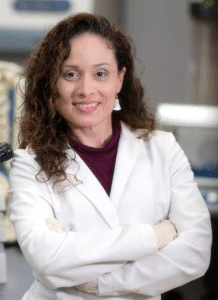 Elizabeth Padilla-Crespo posee un doble bachillerato en Biotecnología y Microbiología Industrial de la Universidad de Puerto Rico en Mayagüez, una maestría (M.S.) en Biología del Georgia Institute of Technology, y un doctorado (Ph.D.) en Microbiología Ambiental de la Universidad de Tennessee en Knoxville. Ha realizado investigaciones en áreas como la biorremediación de hidrocarburos, pesticidas, solventes clorados y biopelículas en instituciones como la Escuela de Medicina de Harvard, el Laboratorio Nacional del Departamento de Energía en Berkeley (California), la Universidad de Wisconsin–Madison y la Universidad de Arkansas. Sus investigaciones han sido reconocidas con premios en foros científicos en Estados Unidos, Inglaterra y Japón, y ha desarrollado proyectos en países como Tailandia, Suecia y Nueva Zelanda. Entre sus distinciones se destacan la NSF Graduate Research Fellowship y el Kika de la Garza Fellowship del Departamento de Agricultura de los Estados Unidos (USDA). Además, la Dra. Padilla-Crespo ha incursionado en el campo de la política pública científica, colaborando tanto con la Fundación Nacional de Ciencias (NSF) como en el Congreso de los Estados Unidos, donde se desempeñó como STEM Policy Fellow del Congressional Hispanic Caucus Institute (CHCI). Actualmente, se desempeña como Profesora Investigadora Distinguida en el Recinto de Aguadilla de la Universidad Interamericana de Puerto Rico. Su labor se enfoca en la aplicación de herramientas microbiológicas y moleculares para caracterizar la biodiversidad de comunidades microbianas y explorar su potencial en aplicaciones de biotecnología ambiental. Su línea de investigación también abarca temas como las interacciones planta-microbio, las relaciones virus-hospedero y los procesos de biorremediación. Como parte de su compromiso docente y científico, ha realizado estancias y pasantías en la Universidad KMUTT (Tailandia), el Laboratorio Nacional del Departamento de Energía en Oak Ridge (Tennessee), la Universidad de Arkansas y el USDA Agricultural Research Service en Mississippi. Le apasiona formar a la próxima generación de científicos puertorriqueños y fomentar colaboraciones estratégicas que fortalezcan el perfil investigativo de su recinto, donde actualmente lidera proyectos subvencionados por agencias como la NSF, el USDA y el Departamento de Educación Federal.
Elizabeth Padilla-Crespo posee un doble bachillerato en Biotecnología y Microbiología Industrial de la Universidad de Puerto Rico en Mayagüez, una maestría (M.S.) en Biología del Georgia Institute of Technology, y un doctorado (Ph.D.) en Microbiología Ambiental de la Universidad de Tennessee en Knoxville. Ha realizado investigaciones en áreas como la biorremediación de hidrocarburos, pesticidas, solventes clorados y biopelículas en instituciones como la Escuela de Medicina de Harvard, el Laboratorio Nacional del Departamento de Energía en Berkeley (California), la Universidad de Wisconsin–Madison y la Universidad de Arkansas. Sus investigaciones han sido reconocidas con premios en foros científicos en Estados Unidos, Inglaterra y Japón, y ha desarrollado proyectos en países como Tailandia, Suecia y Nueva Zelanda. Entre sus distinciones se destacan la NSF Graduate Research Fellowship y el Kika de la Garza Fellowship del Departamento de Agricultura de los Estados Unidos (USDA). Además, la Dra. Padilla-Crespo ha incursionado en el campo de la política pública científica, colaborando tanto con la Fundación Nacional de Ciencias (NSF) como en el Congreso de los Estados Unidos, donde se desempeñó como STEM Policy Fellow del Congressional Hispanic Caucus Institute (CHCI). Actualmente, se desempeña como Profesora Investigadora Distinguida en el Recinto de Aguadilla de la Universidad Interamericana de Puerto Rico. Su labor se enfoca en la aplicación de herramientas microbiológicas y moleculares para caracterizar la biodiversidad de comunidades microbianas y explorar su potencial en aplicaciones de biotecnología ambiental. Su línea de investigación también abarca temas como las interacciones planta-microbio, las relaciones virus-hospedero y los procesos de biorremediación. Como parte de su compromiso docente y científico, ha realizado estancias y pasantías en la Universidad KMUTT (Tailandia), el Laboratorio Nacional del Departamento de Energía en Oak Ridge (Tennessee), la Universidad de Arkansas y el USDA Agricultural Research Service en Mississippi. Le apasiona formar a la próxima generación de científicos puertorriqueños y fomentar colaboraciones estratégicas que fortalezcan el perfil investigativo de su recinto, donde actualmente lidera proyectos subvencionados por agencias como la NSF, el USDA y el Departamento de Educación Federal.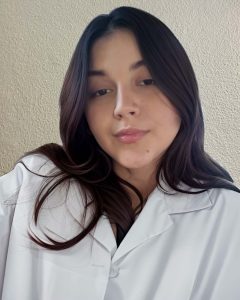 Lizmarie Ruiz Zambrana es estudiante del programa de Microbiología en la Universidad Interamericana de Puerto Rico, Recinto de Aguadilla. Participará en el simposio con una presentación de afiche, titulada Temperature-Dependent Growth of Coagulase-Positive Staphylococcus aureus in Ready-to-Eat Potato Salad: Implications for Food Safety. Su futura área de estudio es medicina. Su motivación para realizar esta investigación surge del interés por la microbiología de alimentos y la implicación del buen manejo y almacenamiento de estos para garantizar la inocuidad alimentaria. Su participación en el evento resalta su compromiso con la investigación y el desarrollo académico en su campo de estudio.
Lizmarie Ruiz Zambrana es estudiante del programa de Microbiología en la Universidad Interamericana de Puerto Rico, Recinto de Aguadilla. Participará en el simposio con una presentación de afiche, titulada Temperature-Dependent Growth of Coagulase-Positive Staphylococcus aureus in Ready-to-Eat Potato Salad: Implications for Food Safety. Su futura área de estudio es medicina. Su motivación para realizar esta investigación surge del interés por la microbiología de alimentos y la implicación del buen manejo y almacenamiento de estos para garantizar la inocuidad alimentaria. Su participación en el evento resalta su compromiso con la investigación y el desarrollo académico en su campo de estudio.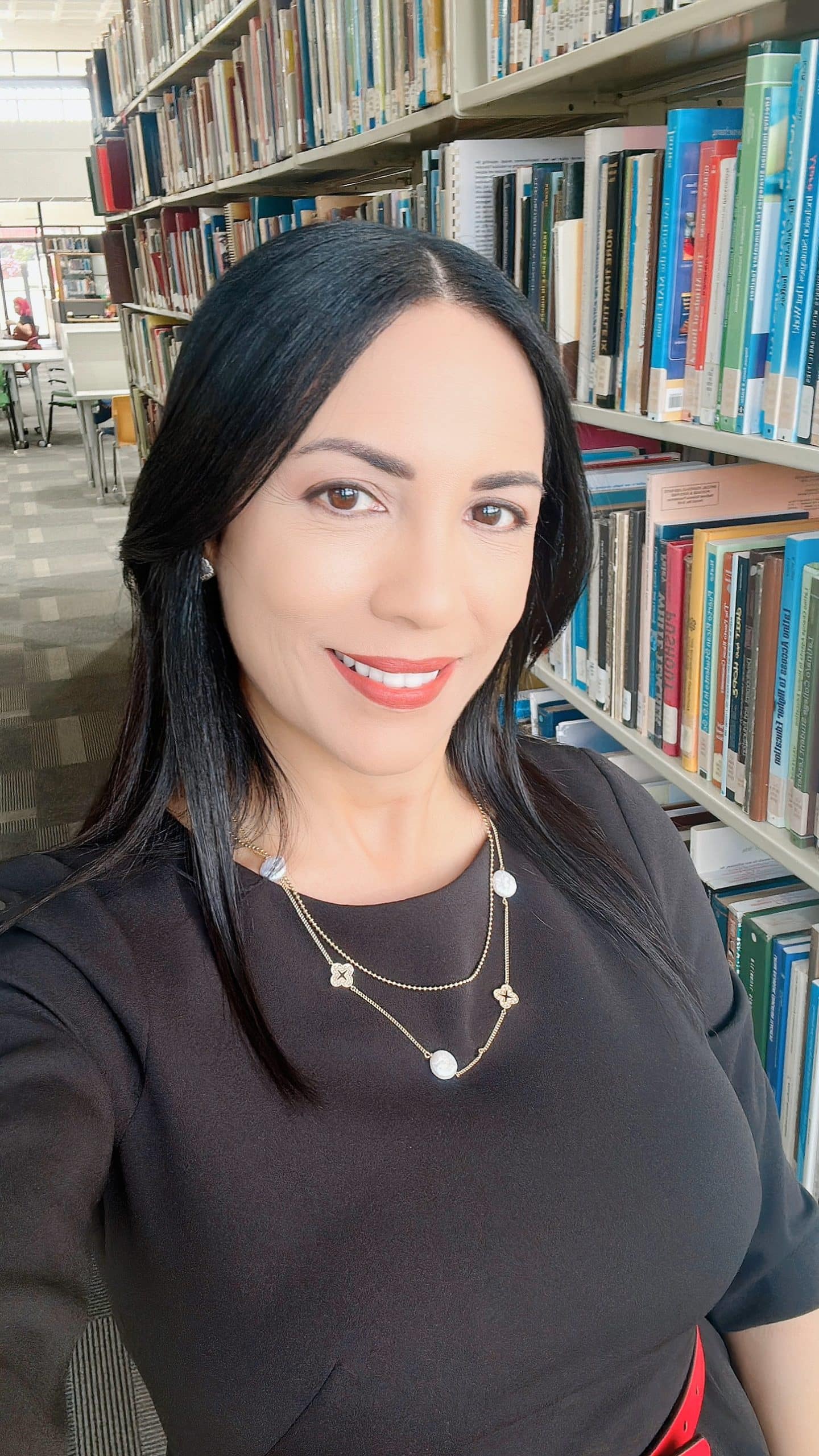 La Dra. Madeline Velázquez posee un bachillerato en ciencias (B.S.) en Microbiología Industrial de la Universidad de Puerto Rico Recinto de Mayagüez. Luego completó una maestría (M.S.) y un doctorado (Ph.D.) en Microbiología de Alimentos de la Universidad de Minnesota en St. Paul, Minnesota. Su disertación doctoral se tituló “Potential role of human gut microflora and exogenous probiotic bacteria in the metabolism of dietary precursors with potential health benefits”. También realizó un grado postdoctoral en Investigación Clínica en el Centro de Ciencias de la Salud de la Universidad de Texas en San Antonio, Texas.
La Dra. Madeline Velázquez posee un bachillerato en ciencias (B.S.) en Microbiología Industrial de la Universidad de Puerto Rico Recinto de Mayagüez. Luego completó una maestría (M.S.) y un doctorado (Ph.D.) en Microbiología de Alimentos de la Universidad de Minnesota en St. Paul, Minnesota. Su disertación doctoral se tituló “Potential role of human gut microflora and exogenous probiotic bacteria in the metabolism of dietary precursors with potential health benefits”. También realizó un grado postdoctoral en Investigación Clínica en el Centro de Ciencias de la Salud de la Universidad de Texas en San Antonio, Texas. Eliezer Meléndez González es estudiante del programa de Maestría en Biología con especialidad en Biotecnología Molecular. Su objetivo a largo plazo es continuar desarrollándose integralmente como persona, combinando su crecimiento personal con su formación científica. Participará en el simposio con una presentación tipo afiche. El título de su presentación es «Aumentando la conversión de tioles 3MH y 4MMP en Saccharomyces cerevisiae para la Enología». Su participación destaca su compromiso con la investigación en el área de biotecnología aplicada a la ciencia de los alimentos y bebidas fermentadas.
Eliezer Meléndez González es estudiante del programa de Maestría en Biología con especialidad en Biotecnología Molecular. Su objetivo a largo plazo es continuar desarrollándose integralmente como persona, combinando su crecimiento personal con su formación científica. Participará en el simposio con una presentación tipo afiche. El título de su presentación es «Aumentando la conversión de tioles 3MH y 4MMP en Saccharomyces cerevisiae para la Enología». Su participación destaca su compromiso con la investigación en el área de biotecnología aplicada a la ciencia de los alimentos y bebidas fermentadas. Doraliz Hernández Rodríguez es estudiante del programa de Ciencias en Consejería Psicológica con especialidad en Familia. Entre sus metas a largo plazo se encuentra la realización de un grado doctorado en Psicología Clínica, con el propósito de profundizar en el conocimiento teórico y práctico de la disciplina. Asimismo, aspira a especializarse en el área de psicooncología y en intervenciones psicológicas asistidas con animales, con el fin de ofrecer un abordaje integral y humanizado a las personas que atraviesan situaciones de enfermedad o vulnerabilidad emocional. Participará en el simposio con una presentación tipo afiche. El título de su presentación es «El Rol de las Mascotas en el Contexto Familiar Multiespecie». Su participación destaca su compromiso con la investigación en el área de la psicología y la relación humano-animal.
Doraliz Hernández Rodríguez es estudiante del programa de Ciencias en Consejería Psicológica con especialidad en Familia. Entre sus metas a largo plazo se encuentra la realización de un grado doctorado en Psicología Clínica, con el propósito de profundizar en el conocimiento teórico y práctico de la disciplina. Asimismo, aspira a especializarse en el área de psicooncología y en intervenciones psicológicas asistidas con animales, con el fin de ofrecer un abordaje integral y humanizado a las personas que atraviesan situaciones de enfermedad o vulnerabilidad emocional. Participará en el simposio con una presentación tipo afiche. El título de su presentación es «El Rol de las Mascotas en el Contexto Familiar Multiespecie». Su participación destaca su compromiso con la investigación en el área de la psicología y la relación humano-animal.
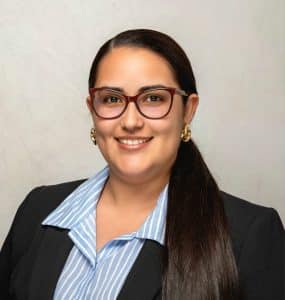
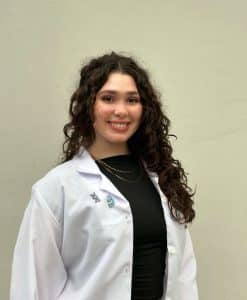 Kimberly Valentín Acevedo es estudiante del programa de BS Biotecnología con menor en Toxicología en la Universidad Interamericana de Puerto Rico, Recinto de Aguadilla. Participará en el simposio con una presentación afiche titulada Pioneering Extremophile Biotechnology at Interamerican Puerto Rico: The Case of Sulfolobus spp. Su futura área de estudio es un PhD en Farmacología. Su motivación para realizar esta investigación surge de su deseo de ser parte del desarrollo innovador en la industria biotecnológica ya que tiene como meta formar parte de un equipo que esté constantemente buscando maneras para mejorar la calidad de vida y erradicar enfermedades. Su participación en el evento resalta su compromiso con la investigación y el desarrollo académico en su campo de estudio.
Kimberly Valentín Acevedo es estudiante del programa de BS Biotecnología con menor en Toxicología en la Universidad Interamericana de Puerto Rico, Recinto de Aguadilla. Participará en el simposio con una presentación afiche titulada Pioneering Extremophile Biotechnology at Interamerican Puerto Rico: The Case of Sulfolobus spp. Su futura área de estudio es un PhD en Farmacología. Su motivación para realizar esta investigación surge de su deseo de ser parte del desarrollo innovador en la industria biotecnológica ya que tiene como meta formar parte de un equipo que esté constantemente buscando maneras para mejorar la calidad de vida y erradicar enfermedades. Su participación en el evento resalta su compromiso con la investigación y el desarrollo académico en su campo de estudio.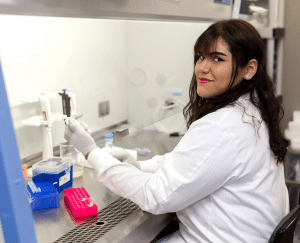 Karla S. Arcelay Garcia es estudiante del programa de Microbiología con menor en Pre Médica en la Universidad Interamericana de Puerto Rico, Recinto de Aguadilla. Participará en el simposio con una presentación afiche, titulada Detection of Vibrio spp. via microbiological and molecular biology techniques. Su futura área de estudio es MD-PhD. Su motivación para realizar esta investigación surge de un profundo interés en la identificación y monitoreo de especies del género Vibrio (Vibrio spp.) en cuerpos de agua en Puerto Rico. Dado que estas bacterias pueden representar un riesgo significativo para la salud pública y el ecosistema acuático. Su participación en el evento resalta su compromiso con la investigación y el desarrollo académico en su campo de estudio.
Karla S. Arcelay Garcia es estudiante del programa de Microbiología con menor en Pre Médica en la Universidad Interamericana de Puerto Rico, Recinto de Aguadilla. Participará en el simposio con una presentación afiche, titulada Detection of Vibrio spp. via microbiological and molecular biology techniques. Su futura área de estudio es MD-PhD. Su motivación para realizar esta investigación surge de un profundo interés en la identificación y monitoreo de especies del género Vibrio (Vibrio spp.) en cuerpos de agua en Puerto Rico. Dado que estas bacterias pueden representar un riesgo significativo para la salud pública y el ecosistema acuático. Su participación en el evento resalta su compromiso con la investigación y el desarrollo académico en su campo de estudio.
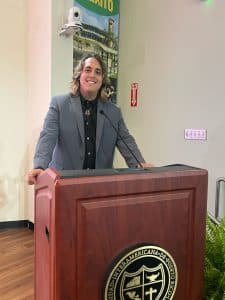

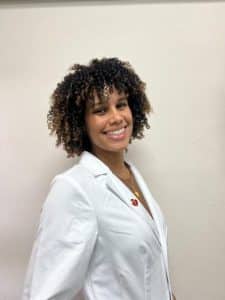


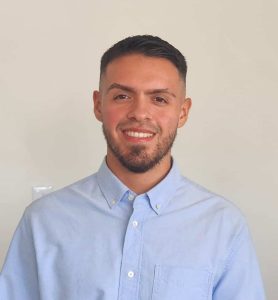
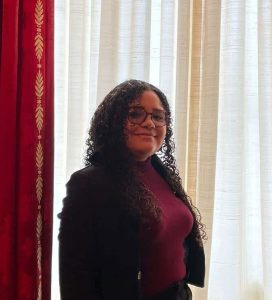

 Sonia Y. Estrella Salas es estudiante del programa de Maestría en Consejería Psicológica con Especialidad en Familia. Sus objetivos a largo plazo incluyen establecer una clínica multidisciplinaria de servicios especializados en el área oeste, enfocada en la prestación de tratamiento psicológico, terapias especializadas y programas educativos para la prevención e identificación temprana de condiciones de salud mental. Además, desea crear campañas de concienciación y promoción del autocuidado en salud mental, con el objetivo de romper estigmas generacionales y fomentar una cultura de bienestar emocional. Participará en el simposio con una presentación tipo afiche. El título de su presentación es «Actitud de los hombres hacia la búsqueda de ayuda psicológica». Su participación destaca su compromiso con la investigación en el área de la salud mental y la consejería psicológica.
Sonia Y. Estrella Salas es estudiante del programa de Maestría en Consejería Psicológica con Especialidad en Familia. Sus objetivos a largo plazo incluyen establecer una clínica multidisciplinaria de servicios especializados en el área oeste, enfocada en la prestación de tratamiento psicológico, terapias especializadas y programas educativos para la prevención e identificación temprana de condiciones de salud mental. Además, desea crear campañas de concienciación y promoción del autocuidado en salud mental, con el objetivo de romper estigmas generacionales y fomentar una cultura de bienestar emocional. Participará en el simposio con una presentación tipo afiche. El título de su presentación es «Actitud de los hombres hacia la búsqueda de ayuda psicológica». Su participación destaca su compromiso con la investigación en el área de la salud mental y la consejería psicológica.